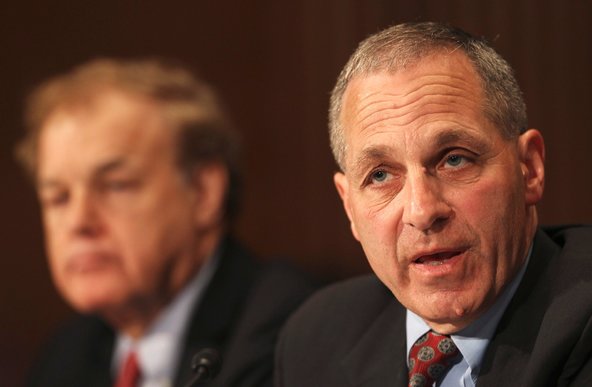 Gary Cameron/ReutersLouis Freeh, the trustee overseeing MF Global’s bankruptcy case, at a Senate panel last year.
Gary Cameron/ReutersLouis Freeh, the trustee overseeing MF Global’s bankruptcy case, at a Senate panel last year.
Even while accusing Jon S. Corzine and other former MF Global executives of “negligent conduct” that may have fueled the brokerage firm’s collapse, a bankruptcy trustee has agreed to postpone a lawsuit against them.
Instead, Mr. Corzine’s lawyers will enter mediation next week with the trustee, Louis J. Freeh, according to people briefed on the talks who were not authorized to speak publicly.
The development is an encouraging sign for Mr. Corzine, a former senator and New Jersey governor who underwent a humbling ouster when MF Global collapsed in October 2011. Lawyers for Mr. Corzine are also in negotiations with another MF Global trustee and some of the firm’s investors who filed a separate suit against him in 2011, the people briefed on the talks said.
Related Links
Yet some lawyers involved are skeptical that the talks will yield a settlement. And while the mediation offers promise for Mr. Corzine, he remains caught in a thicket of litigation.
MF Global investors continue to circle Mr. Corzine, blaming him for their losses when the firm collapsed. And even as Mr. Freeh agreed to mediation in recent weeks, his lawyers drafted a lawsuit against Mr. Corzine, just in case.
Mr. Freeh, the trustee for MF Global’s parent company and a former director of the F.B.I., hinted at the suit in a report filed on Thursday. The filing, echoing similar reports issued last year by Congressional investigators and the other bankruptcy trustee, blamed MF Global executives for engineering a “risky business strategy” and ignoring “glaring deficiencies” in internal controls.
The findings, according to the people who were briefed, laid the groundwork for the potential lawsuit to claim that executives had breached their fiduciary duty to the firm.
In reply, a spokesman for Mr. Corzine argued that “there simply is no basis for the suggestion that Mr. Corzine breached his fiduciary duties or was negligent.” The spokesman, Steven Goldberg, added that “the trustee’s report, with its allegations of negligent conduct, is a clear case of Monday morning quarterbacking.”
Mr. Corzine, he noted, inherited a firm in 2010 that lost money in each of the previous three years. “Mr. Corzine worked tirelessly and in good faith to turn the business around,” Mr. Goldberg said.
The potential lawsuit, which could help Mr. Freeh recover money for MF Global’s creditors, would hinge on what Mr. Corzine knew about the firm’s mounting problems. Mr. Freeh’s report argued that he knew enough to be concerned.
At a May 2010 board meeting, the report said, Mr. Corzine learned that MF Global’s internal controls were “flawed.” He and other managers received documents detailing dozens of gaps between the firm’s written policies regarding risk and its actual practices.
Despite knowing the firm’s precarious position, Mr. Freeh said, Mr. Corzine increased a risky bet on European debt. While the bonds were not by themselves to blame for the fall of MF Global, the bet unnerved the firm’s investors and ratings agencies.
Some employees, balking at the risk taking, planned to create a risk system to forecast potential losses. But, according to Mr. Freeh, Mr. Corzine “stalled” the effort because he considered it unduly expensive.
The warning signs continued over the next year. In June 2011, MF Global’s internal auditors foreshadowed potential problems with customer money.
MF Global, the auditors cautioned, placed “unnecessarily high reliance on key employees” to manage the firm’s liquidity reporting, including a single employee in Chicago, Edith O’Brien. In the aftermath of the bankruptcy, Ms. O’Brien emerged as a crucial figure, as e-mails suggested that she had accidentally transferred $175 million in customer money to an account at JPMorgan Chase. Ultimately, more than $1 billion in customer money vanished from MF Global.
Despite knowing the risks of relying on Ms. O’Brien, according to Mr. Freeh, MF Global’s management looked the other way. “The business accepts this risk and a formal action plan will not be tracked,” MF Global employees wrote at the time, Mr. Freeh’s report said.
Federal authorities continue to investigate the misuse of customers’ money. Mr. Corzine has not been accused of any wrongdoing, and internal e-mails suggest he was not aware that the money sent to JPMorgan belonged to customers.
Mr. Goldberg, the spokesman for Mr. Corzine, said that firms like JPMorgan improperly pocketed customers’ money when MF Global entered a tailspin. He said Mr. Freeh’s report “intentionally ignores the failure of counterparties to fulfill their commercially contracted obligations to MF Global and the profound impact this failure had on MF Global’s customers and other stakeholders.”
The back-and-forth is an inauspicious start for the mediation.
Yet Mr. Freeh, according to a footnote on the last line of the 124-page report, agreed to postpone the lawsuit, “pending the completion of the mediation.” And on Friday, Mr. Freeh will ask a bankruptcy court judge to approve a liquidation plan for MF Global, a deal that would shift power from the trustee to a panel of creditors who could continue the mediation with Mr. Corzine. His talks with James W. Giddens, the MF Global trustee responsible for returning money to customers, will also continue.
Those talks could gain momentum as Mr. Giddens’s efforts for customers proceed. Last month, Mr. Giddens in effect secured $500 million for customers from JPMorgan Chase. The deal, if approved by a judge, would pave the way for MF Global’s customers to recover nearly all the money that disappeared when the brokerage firm imploded.
Article source: http://dealbook.nytimes.com/2013/04/04/report-hints-at-possible-mf-global-suit/?partner=rss&emc=rss
Speak Your Mind
You must be logged in to post a comment.